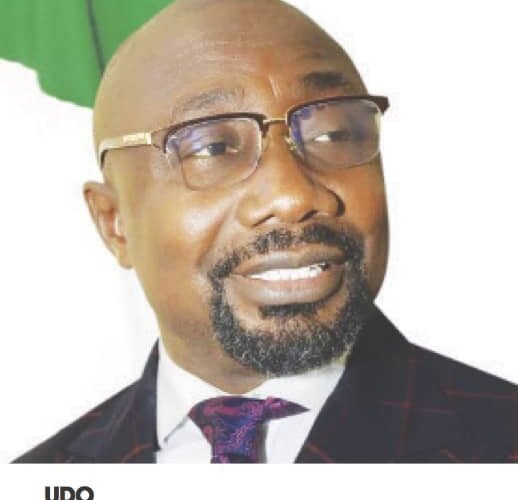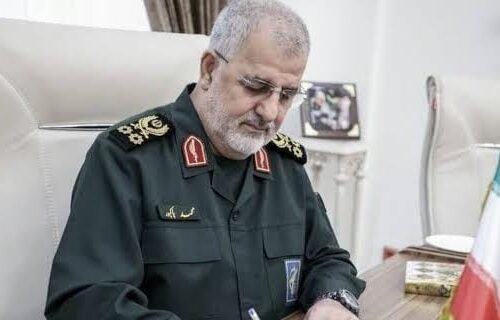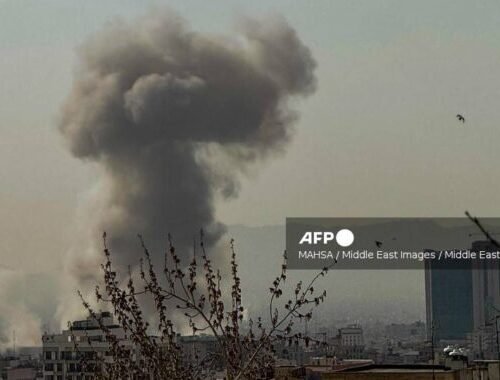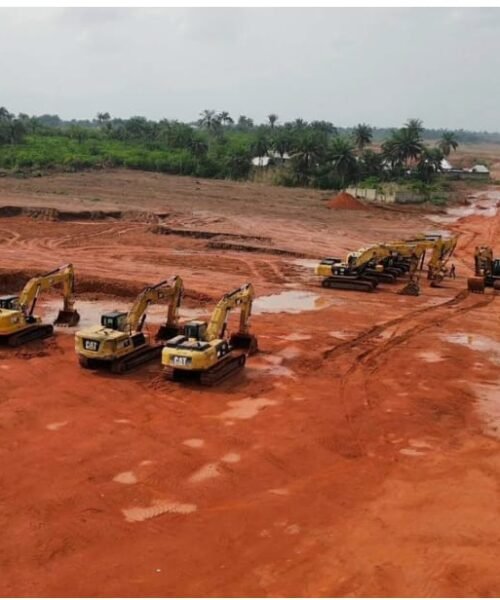Okey Udo, ADP Vice-Presidential candidate: FG must focus on fighting hunger, insecurity
Vice Presidential candidate of the Action Democratic Party (ADP) in the 2023 elections, Dr. Okey Okoro Udo, has said that hunger and insecurity are critical issues that need immediate attention.

While expressing his fears for the country, he noted that Nigeria’s position as 103 out of 117 countries on the Global Hunger Index underscores the severe food insecurity affecting millions of the citizens.
In an interview with VINCENT KALU, the clergyman pointed out that the government’s economic policies have been overshadowed by trial-and-error approaches, such as the abrupt subsidy removal without adequate social safety nets. He also highlighted what the Tinubu administration should do to fight hunger and insecurity.
Following the Supreme Court judgment, state governors have been stopped from tampering with local government statutory allocations. What is your take on this?

It is quite interesting to me as a grassroots advocate. This judgment is a significant step towards strengthening local governance and ensuring local governments can operate independently.
According to the Nigerian Bureau of Statistics (NBS), local governments contribute about five to ten per cent to Nigeria’s GDP through various economic activities. This financial autonomy can enhance their efficiency and promote grassroots development. A relevant global case study is India’s Panchayati Raj system, where the 73rd Constitutional Amendment Act in the 1990s devolved financial and administrative powers to local government bodies, leading to improved rural infrastructure, agricultural productivity, and reduced corruption. India’s experience demonstrates the benefits of decentralised governance.

The economic survey of India highlights that the involvement of local governments’ in rural development has substantially improved social and economic indicators, even the involvement of more women at grassroots.
Similarly, Nigeria can expect enhanced service delivery, reduced corruption, and more equitable development by granting financial autonomy to local governments. Learning from India’s Panchayati Raj system, Nigeria can strengthen its local governance framework, fostering economic growth and social development at the grassroots level.
What are the implications?
I view the implications in terms of enhanced financial autonomy for local governments, which can lead to better service delivery and infrastructure development. It is a proven economic model for development. Even Transparency International’s Corruption Perceptions Index indicates that decentralised financial management reduces corruption. It can also foster economic activities at the grassroots, potentially boosting the local economy and increasing employment opportunities.
The National Assembly is moving to yank off the conduct of LG elections from the state governors. What is your position on this?
Though it could be a double-edged sword, removing the conduct of local government elections from state governors could lead to fairer and more transparent elections. The Economist Intelligence Unit’s Democracy Index highlights that decentralised electoral processes often result in higher voter participation and trust in the electoral system, which is crucial for democratic consolidation.
Fairer elections could lead to more accountable local governments, better reflecting the will of the people, and potentially leading to improved governance and local development. For instance, in India, the decentralisation of local elections through the Panchayati Raj system has empowered local communities, improved public service delivery, and increased political participation at the grassroots level.
As the Igbo proverb goes, ‘Ome na-ala, eme na elu,’ meaning: “What happens in the village also happens in the town,” indicating that local governance impacts broader national governance.
However, we must be wary of the embedded poor political culture of ‘our turn to chop,’ which signifies the deep-rooted corruption and patronage in Nigerian politics. While removing state governors’ control over local elections could reduce electoral malpractice, it could also lead to new challenges, such as power struggles between state and local authorities and the risk of transferring corrupt practices to the local level.
As seen in Brazil’s decentralisation efforts, while municipalities gained financial autonomy and improved service delivery, corruption persisted due to the deeply ingrained political culture. An Igbo proverb says, ‘Ebe onye bi ka ọ na-awachi,’ meaning: ‘Where one lives is where one nurtures,’ emphasising the importance of cultivating integrity and transparency at the local level. For Nigeria, the success of this reform will depend on implementing robust anti-corruption measures and continuous capacity building for local electoral bodies to ensure transparency and accountability.
What could this lead to in the near and long run?
The conduct of local government elections being moved to a national independent electoral body could lead to significant political implications. This shift may create power struggles and instability at the grassroots level as newly empowered local officials adjust to their roles under the new system.
There is also the risk of mismanagement and entrenched corruption at the local level, potentially undermining the benefits of increased electoral independence. Additionally, without effective oversight, these local struggles might exacerbate existing political tensions and hinder effective governance.
To combat these challenges, it’s crucial to implement robust oversight mechanisms and capacity-building programmes for the new electoral body. Ensuring transparency in the electoral process through independent monitoring and auditing can help mitigate corruption and maintain public trust.
Additionally, providing training and resources to local officials will improve their ability to manage resources effectively and address local issues. Engaging civil society and community organisations in oversights and feedback can also enhance accountability and ensure that the reforms lead to meaningful improvements in local governance.
Some analysts are of the views that by stopping the governors from touching the LG funds, and the proposed bill to take away the conduct of council polls from governors could be plans to whittle down the powers of governors, paving the way for President Tinubu to take hold of the 774 LGs in preparation for 2027. Do you share in their sentiments?
Politics is never arithmetic, but calculus. I can hardly concur to that view or refute same. While political manoeuvring might play a role, it is crucial to emphasise the potential governance benefits of these reforms. Local governments with financial and electoral autonomy often lead to improved development outcomes. Research shows that countries with strong local governance structures, such as Switzerland and Germany, experience better public service delivery and higher levels of economic development.
For example, decentralised systems have been linked to more effective implementation of local policies, increased public participation, and greater accountability. The local government position is more of a constitutional stance which they can defend without being manipulated by federal government. Effective local governance can also enhance economic performance by allowing tailored policies that address specific community needs. Thus, although political motivations could be a factor, the potential for more responsive and efficient local governance should be a primary consideration in evaluating these reforms.
What is your assessment of Tinubu’s one year in office?
Assessments of President Tinubu’s first year in office reveal a mixed picture. Economically, Nigeria has faced significant challenges, with inflation soaring to 34.19 per cent, impacting the cost of living and diminishing purchasing power. Despite these pressures, there has been some progress in infrastructure development, including notable projects in transportation and energy.
Efforts towards economic diversification are also showing early promise, with data from the Central Bank of Nigeria indicating a slight increase in foreign direct investment, reflecting cautiously growing investor confidence.
However, the administration has struggled with severe issues related to insecurity and economic hardship. Persistent insurgencies, banditry, and communal violence continue to undermine stability and economic progress.
The removal of fuel subsidies, coupled with high inflation, has exacerbated economic difficulties for many Nigerians.
While the recent increase in the minimum wage to ₦70,000 is a positive step, its success will depend on effective implementation and additional measures to address inflation. These efforts have been overshadowed by trial-and-error policy approaches, such as the abrupt subsidy removal without adequate social safety nets, highlighting the need for more coherent and well-planned strategies to tackle both economic and security challenges effectively.
Additionally, the ongoing politicisation of the Dangote Refinery and the Nigerian National Petroleum Corporation Limited’s focus on fuel importation amidst depleted foreign exchange reserves further complicates the economic landscape.
Do you entertain any fears for the hues and cries over the hunger and insecurity in the country?
Yes, hunger and insecurity are critical issues that need immediate attention. Nigeria’s position as 103 out of 117 countries on the Global Hunger Index underscores the severe food insecurity affecting millions. Key factors include persistent poverty, inadequate infrastructure, and disruptions in agriculture. For instance, frequent clashes between farmers and herders in Benue State have led to widespread displacement, undermining agricultural productivity and exacerbating food shortages. Additionally, land degradation, outdated farming techniques, and climate change further strain food security.
Insecurity in Nigeria, particularly in Northern states like Borno and Plateau, significantly compounds these challenges. The Boko Haram insurgency in the North East has caused massive displacement, disrupted local economies, and severely hindered agricultural activities, leading to acute food shortages and humanitarian crises.
Persistent inter communal violence in Plateau State has destabilised the region, impeding farming and local economic activities. In the South East, the ongoing detention of Mazi Nnamdi Kanu has led to weekly ‘sit-at-home’ orders, halting socio-economic activities and further aggravating economic instability and food insecurity. These security issues disrupt food production and market access, worsening the hunger crisis.
To address these challenges effectively, a multifaceted approach is needed, including enhancing security, supporting displaced populations, and implementing sustainable agricultural practices to stabilise affected regions and promote long-term development.
How could the hunger and insecurity be addressed if your party were in government?
My party is the Action Democratic Party. Our action is professionally driven and human centric. Nigeria leadership is not scarce of policies but devoid of implementation and tainted with selfishness political interests. Addressing hunger and insecurity requires a comprehensive strategy.
For hunger, implementing robust agricultural policies is crucial. Investing in modern farming techniques, such as improved irrigation systems and high-yield crops can significantly boost food production.
For example, Ethiopia’s Agricultural Transformation Agency has successfully increased agricultural output and farmer incomes through such innovations. Supporting smallholder farmers with financial cum seed assistance and access to markets is also vital, as demonstrated by Nigeria’s Anchor Borrowers’ Programme, which has improved productivity and stability for small farmers. But, agriculture is often over politicised.
In terms of insecurity, enhancing security forces through technological upgrades is essential. Advanced technologies like surveillance systems and communication tools can improve security operations. The use of drones in the Philippines for monitoring insurgent activities illustrates how technology can strengthen security measures.
Additionally, addressing socio-economic disparities through development programmes can help reduce the appeal of insurgent groups. Colombia’s targeted development initiatives, which include education and job creation, have shown success in mitigating insurgent recruitment. Almajiris should be reprogrammed for education enhancement, and not for beggarly disposition.
Combating corruption within the security sector is equally important. Ensuring transparency in the allocation of security resources can help reduce corruption. For instance, Ghana’s independent oversight bodies have effectively curtailed corruption in security services.
In Nigeria, addressing local involvement in security-related corruption requires strict anti-corruption measures and enhanced community engagement. Like community policing models in South Africa, involving local populations in security efforts can build trust and improve intelligence, leading to a more effective and accountable security framework.
South East has been crying about marginalisation. How can it be addressed?
The marginalisation is quite glaring. The Nigerian-Biafran War, which lasted from 1967 to 1970, concluded with the declaration of: ‘No victor no vanquished.’ This phrase was meant to symbolise a reconciliation and healing process following the devastating conflict. The war, rooted in political, ethnic, and economic tensions, resulted in significant loss of lives and widespread suffering. The declaration was intended to promote national unity and healing in the aftermath of the conflict.
Despite this declaration, the aftermath of the war left deep scars and ongoing issues of marginalisation and regional disparities. The South East, in particular, is the only region with less than six states, concerns about economic and political exclusion, reflecting the need for continued efforts towards genuine national reconciliation and equitable development.
Addressing these concerns effectively requires meaningful engagement, balanced resource allocation, and fair representation in government to ensure that all regions can contribute to and benefit from the nation’s growth and stability. The South East contributes significantly to Nigeria’s GDP through its industrial and commercial activities, yet it receives a disproportionately low share of federal investment.
According to the Nigerian Bureau of Statistics, the South East’s economic contribution is substantial, but the region has historically lagged in receiving federal infrastructure and development funds compared to other regions.
For instance, the South East lacks major federal infrastructure projects, such as highways and industrial parks, which are more prominent in regions like the North West and South West. Addressing these disparities by allocating federal resources more equitably can enhance economic growth and development in the region.
Ensuring fair representation in federal appointments is crucial for addressing marginalisation.
Historical data shows that the South East has been underrepresented in key federal positions, including ministerial and judiciary roles. During President Muhammadu Buhari’s administration, the South East had limited representation in top ministerial roles, leading to perceptions of exclusion. Such is still being perpetuated in this Tinubu’s administration. Increasing representation from the South East in federal appointments can help address these concerns and ensure that the region’s interests and needs are better represented at the national level.
Targeted investment in infrastructure is vital for stimulating economic growth in the South East. Projects such as the proposed Lagos-Calabar Coastal Railway and the Enugu-Onitsha Expressway could significantly boost economic activity in the region.
Infrastructure investments can also address disparities in access to services and economic opportunities. For example, accelerating the development of the Aba industrial cluster, a major commercial hub could harness its economic potential and provide more job opportunities. Additionally, fostering social cohesion through dialogue and community engagement can help bridge divides and build mutual understanding. Initiatives that promote inter-regional cooperation, such as the Nigerian Economic Summit Group’s regional dialogues, can address grievances and build trust, contributing to balanced economic development and improved social integration in the South East.
Furthermore, the creation of an additional state in the South East and the establishment of a South East Development Commission could provide institutional frameworks to address these issues systematically.
An additional state would ensure more equitable representation and federal resources, while the South East Development Commission could focus on tailored development projects, addressing the region’s specific needs and fostering long-term economic growth and stability.
In effect, the bill for the establishment of the South East Development Commission (SEDC), which the Senate under its President Godswill Akpabio passed in February this year after it was read for the third time and supported by the majority of the senators should be signed and implemented. The House of Representatives passed the same bill in December 2023.
President Bola Tinubu should do well and sign this bill, so that the infrastructural deficit arising from the civil war and years of neglect of the region will be addressed.
Credit: Sun Newspaper







